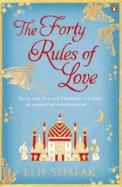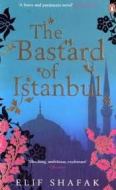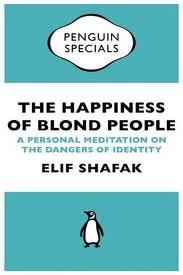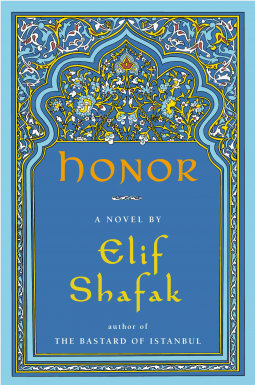
 Elif Shafak writes great stories and as this essay illustrates, she both lives and has already lived an interesting life between East and West; experiencing different cultures and absorbing the influence of a high achieving, single parent mother and her superstitious, story-telling grandmother in a untypical but enriching, matriarchal upbringing.
Elif Shafak writes great stories and as this essay illustrates, she both lives and has already lived an interesting life between East and West; experiencing different cultures and absorbing the influence of a high achieving, single parent mother and her superstitious, story-telling grandmother in a untypical but enriching, matriarchal upbringing.

Elif Shafak, Publicity shot by Ebru Bilun – wikipedia
As a young pupil she learnt what it means to be on the receiving end of prejudiced comments, introducing her to the clichéd stereotypes cast about by those who might never have experienced but seemed “to know” what it meant to be Turkish, that false responsibility, those who leave will all take on, for the actions of government or other citizens, on behalf of their maternal country and people.
Elif Shafak has inherited and nurtured a healthy imagination and studied many of the great philosophers, with a particular interest in Rumi, sometimes witnessed through her novels and now combines her knowledge with first-hand observations of how cultural differences are perceived in this short book.
The title of the essay was inspired by a conversation overheard at the Rotterdam airport in the Netherlands between Turkish fathers, one despairing of the difficulty of living in proximity to his downstairs neighbour. She developed a habit of calling the police each time his children made too much noise playing in the apartment, causing his family much stress and anxiety, because the police invariably arrived with sirens blazing – makes me wonder what story she told the police, and thankful that my neighbour isn’t so bad after all!
The man finishes by asking his friend in earnest, how it is that blond children are so quiet and well-disciplined, introducing us to Shafak’s reflections on identity, cultural difference and the inherent, almost unavoidable angst of first generation immigrants worldwide.
The immigrant must be prepared to swallow his share of humiliations every day. He has to accept that life will treat him with disrespect and that he’ll be smacked and jostled with undue familiarity.
 She discusses the perception that happiness can be found in the West, less likely to have to deal with war, warlords, tribal conflict, poverty, corruption, human-rights violations or major natural disasters and the equally ingrained counter-assumption that life in the East is more real and less degenerate than in the West: where society is so selfish and individualistic that communal and family ties have virtually disappeared, unable to support a person, especially the elderly, in a time of need.
She discusses the perception that happiness can be found in the West, less likely to have to deal with war, warlords, tribal conflict, poverty, corruption, human-rights violations or major natural disasters and the equally ingrained counter-assumption that life in the East is more real and less degenerate than in the West: where society is so selfish and individualistic that communal and family ties have virtually disappeared, unable to support a person, especially the elderly, in a time of need.
A secondary-school student I met in Ankara during a literary event put this to me in a slightly different way. “If you are young, it is better to live in the West than in the East,” he said. “But if you are old, then it is better to be in the East than in the West, because we respect our elders, whereas they don’t. In Europe I have seen old ladies in supermarkets buying one courgette, one carrot, one tomato, one bunch of parsley. Have you ever seen a Muslim woman doing that? No! We always buy at least half a kilo, if not more, because we cook for the entire family.”
What seems to be missing in the immigration experience is often lack of community, the lack of acceptance or gesture of kindness and therefore difficulty in integration, families are often not made to feel welcome (except among their own kind) which then encourages them to live separately and to maintain their own traditions and cultural perceptions and habits, rather than merging with the new country and culture. It can also breed resentment, particularly if it wasn’t a mutual decision to leave or even a choice, as in times of war.
It is often true that it must take at least one generation to normalise integration, but in more closed communities whose occupants themselves have little curiosity for the outsider or have not travelled and come to understand how and why things are done differently, with an altogether different logic elsewhere, this separation is at risk of continuing into multiple generations, especially where there are clear physical differences between people that can provoke prejudice, judgement or even worse, racism.
 For me, most of the time I enjoy being confronted with those genuine mind-bending situations that require one to figure out how people came to see or do something in a way so different from our own – with the exception of violent or inhumane acts, but even behind those practices, there is a story to be told and a history to be understood, which doesn’t make it right, but can assist us to at least consider these practices in context, something Elif Shafak explores in her latest gripping novel ‘Honour‘.
For me, most of the time I enjoy being confronted with those genuine mind-bending situations that require one to figure out how people came to see or do something in a way so different from our own – with the exception of violent or inhumane acts, but even behind those practices, there is a story to be told and a history to be understood, which doesn’t make it right, but can assist us to at least consider these practices in context, something Elif Shafak explores in her latest gripping novel ‘Honour‘.
An immigrant myself, I understand many of the isolating factors inherent in such a status, especially when it is necessary to learn a new language. Whilst it is not easy to participate in a traditional society with its many rituals and social codes, it is more likely that an immigrant will find success and contentment in creating a business or activity of their own, something unique that is or will be valued, than putting themselves up against their compatriots and being disappointed time after time, especially if living outside the larger multicultural cities.
This is a short read and a refreshing, open-minded perspective, from a woman who interacts with people in both the East and the West, always interesting to read and listen to.
In this life, if we are ever going to learn anything, we will be learning it from those who are different from us. It is in the crossroads of ideas, cultures, literatures, traditions, arts and cuisines that humanity has found fertile grounds for growth.

Think these have to be added to my list. Thanks. Feels like it has been a while since i’ve seen a blog post from you. Glad you’re back.
LikeLike
That’s true, work, travel, too much using my brain for other(s) activities, needed recharging 🙂 Nothing like a Penguin Short to get back into it – and the prospect of a visit to Istanbul in May!
LikeLike
Ahh. A friend of mine was there a couple of months ago and loved it.
LikeLike
I’ll definitely have to get hold of these – thank you for whetting my appetite! I seem to have spent most of my life immigrating, and this post has certainly sparked a whole new train of ideas in me on the subject..
LikeLike
Would love to read about them! I think this author has a wonderful and unique perspective.
LikeLike
I have “honour” with me. I will read it soon. This book you reviewed seems like my kind of book. I am an immigrant myself and wouldn’t go as far as living in a country that requires me to learn a new language, I think I would die of frustration and boredom! I also felt the loss of status and social circle around friends whom I grew up with disconcerting. Thanks for writing about Elif Shafak.
LikeLike
I’ve finished ‘Honour’ now and the more I read, the more it grew on me, in her last book she wrote about an American family and it didn’t quite work, but here she seems to be much more in her element and it shows, great characters – I could have read an entire book just about Jumila the midwife and her many clients and way of exchanging with the community.
LikeLike
I’m pleased to hear that “Honour” is good. I can’t wait!
LikeLike
This is the kind of book I would like to read. I’ve never heard of it, so thanks for the review.
LikeLike
This is a short non-fiction book, but I also recommend her novels, she’s a wonderful storyteller, just like her grandmother was.
LikeLike
Diversity is a huge strength, yet our history is replete with us doing our damnedest to squash it. Quite thought provoking.
LikeLike
Which is why it is refreshing to come across those who have experienced it, learned something and are sharing it. There are many classic cases of fear or avoidance of the unknown and a propensity to destroy it rather than engaging with it. This is a little step forward at least.
LikeLike
Claire, your personal experience gives you a unique perspective into the challenges of assimilating into a new culture. When a newcomer is able to understand and respect the laws and culture of a chosen homeland while still proudly celebrating his or her roots, I believe a formula for success is established. Cultural diversity in a perfect world benefits everyone.
LikeLike
I picked up Shafak’s book “The Forty Rules of Love” at the library not long ago, but for whatever reason didn’t really get into it. I will try again, and will read her essay.
How interesting her, and your, take on immigrants. My husband’s whole family is still living in a traditional society, yet even within that and even in the time we’ve been married there have been seismic changes in all aspects of life. First came satellite tv and then the internet and now it seems that all places and peoples are beginning to resemble one another. The traditional continuity of caring for your children until they marry and then having them care for you is shifting and they are facing some of the same issues we have regarding how to care for an elderly and or infirm parent when you yourself must work outside the home. I found the image of a European woman buying vegetables for one vs. the abundance of cooking for a family so true, and so sad.
Having lived for many years abroad I know that it comes with a certain freedom as well as a certain loneliness. You are freed of your own cultural baggage yet must struggle to find your way in another world where you have little to lean on.
Fascinating. Thanks for your post!
LikeLike
I hope you try Forty Rules again, a few people I passed the book on to had a problem with the contemporary story and it’s true, the book really excels when it follows the manuscript story of Shams(the story within the story) and this is what stayed with me long after reading it.
Thanks for sharing your observations about your husbands family, I agree and see similar things happening in my husband’s family and culture – I read an interesting interview in the LA Review recently between a writer and three or four 18 year old women who are university students in Palestine today, and represented varying degrees of liberalism, however they all agreed that even marriage expectations have now changed, where traditionally a man expected his wife to stay at home and be with children, now a university education and the ability to work seems to be almost a pre-requisite. This not only only makes them more mobile, it will likely mean that their families become that much smaller and as you say will then face similar issues.
Interestingly, in Elif Shafak’s latest book ‘Honour’ all the family of 8 girls from the small Kurdish village were given an education – to better boost their prospects.
That struggle to find our way in a new culture/country without support is a great and almost universal difficulty for immigrants, little understood or appreciated by the hosts or those from where we have come; it’s the catch-22 of life abroad, which is why it is necessary to bond with others in a similar situation if possible – I would struggle even more without my own very good and special friend who totally gets it and can hear and share everything without judgement.
LikeLike
Yes indeedy… and with immigrant issues filling U.S. news of late I can’t help but get frustrated when many seem to portray undocumented hard-working people, many of whom live below the poverty level, as lazy leeches, when actually they are vital to our economy and deserve our support. I was a “fortunate” immigrant, moving to another country by choice and not out of economic need.
As for the women… in the traditional cultures I have personal knowledge of, the majority of the women do work–whether as a shopkeeper or a physician—often because their families need the financial support but also because they enjoy it. This means they juggle responsibilities just like we do, but often without some of the assistance we get via technology or being able to delegate some chores to others ($$). The world is changing so rapidly, and particularly in developing countries.
I will definitely give Shafak’s work another try. Thanks!
LikeLike
This book really sounds fascinating! I feel I might be able to relate to it in some ways too.
LikeLike
I hope you get to read it, possibly one of the shortest reads ever! But then you are introduced to a new author and I think you may enjoy her new book due out next month.
LikeLike
First I am intrigued and going to read the book as well as learn more about the author.
Second, you described the author and her books in such an engaging way that I DO want to find out more, nicely done.
Third, your site is inspiring, thank you for writing! I leave with a smile on my face and the excitement that I get to jump into a book.
LikeLike
Thank you Rachelle, your amazing recipes and pictures make me want to do the same, take the plunge and have a go at something new, you certainly know how to inspire, using many of the senses as well as your words.
LikeLike
Pingback: Honour | Word by Word
Pingback: For More infrmation: | Om Happiness
Pingback: Top Reads 2013 | Word by Word
Pingback: 10 Books I’m Looking Forward to Reading in 2017, Mirrors, Blooms, Wonder, War, Not Nothing – Word by Word
Pingback: Three Daughters of Eve by Elif Shafak – Word by Word
Pingback: The Other Side of the Mountain by Erendiz Atasü tr. Elizabeth Maslen #WITMonth – Word by Word
Pingback: Berji Kristen: Tales From the Garbage Hills by Latife Tekin (1993) – Word by Word
Pingback: 20 Books of Summer 2023 – Word by Word
Pingback: The Island of Missing Trees by Elif Shafak – Word by Word